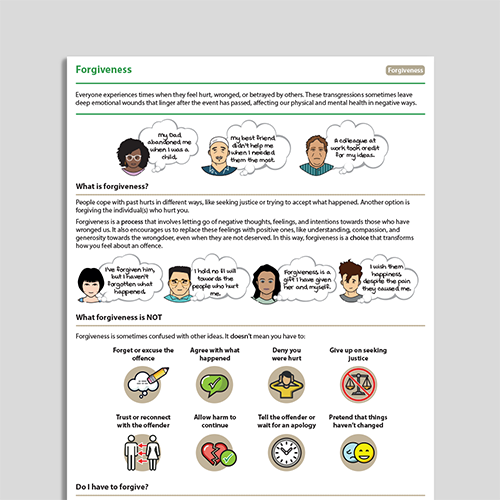Forgiveness: A Way To Cope With Transgression

What’s New?
We’re pleased to share our new information handout on Forgiveness. Designed to support anyone who has faced interpersonal hurt, it explains what forgiveness is, what it involves, and how it differs from other related concepts.
The impact of unresolved hurt
Everyone experiences interpersonal hurts, such as being overlooked, mistreated, or intentionally wronged. People respond to these situations in different ways – by “letting go” of the offense, seeking justice, wanting revenge, or choosing to forgive the other individual. Sometimes, these hurts can lead to a state of unforgiveness, characterised by anger, bitterness, hostility, and fear. Research indicates that persistent unforgiveness can have a negative impact on our relationships, physical health, and mental health[1,2,3].
What is forgiveness?
Forgiveness has been defined in a variety of ways, including:
- “A process that leads to the reduction of unforgiveness (bitterness, anger, etc.) and the promotion of positive regard (love, compassion, or simply, sympathy and pity) for the offender.” [4]
- “Letting go of negative affect (e.g., hostility), negative cognitions (e.g., thoughts of revenge), and negative behavior (e.g., verbal aggression) in response to considerable injustice, and also may involve responding positively toward the offender (e.g., compassion).”[5]
Fortunately, there is more agreement on what forgiveness is not[6,7,8]. For instance, forgiveness is not the same as:
- Acceptance (tolerating the offence).
- Acquiescence (allowing harm to continue).
- Condoning (dismissing or ignoring wrongdoing).
- Denial (excusing the offence).
- Forgetting (mentally burying the offence).
- Leniency (pardoning the transgression).
- Reconciliation (re-establishing trust with the offender).
- Resignation (giving up on justice).
Research indicates that forgiveness has a positive impact on various aspects of well-being[9,10]. Forgiveness is addressed in several evidence-based therapies, including cognitive behavioral therapy (CBT)[11], acceptance and commitment therapy (ACT)[12], compassion focused therapy (CFT)[13], and emotion focused therapy (EFT)[14]. In addition, various ‘forgiveness therapies’ have been proven to be effective, including approaches by Enright and Fitzgibbons[7], Worthington[15] and Rye and Pargament[5].

Who is this resource for?
This information handout is designed for anyone who could benefit from understanding and exploring forgiveness. It’s especially helpful for those who are dealing with lingering feelings after being wronged and aren’t sure how to move forward. It can also support anyone who has mixed feelings about forgiveness.
How can it be used?
The Forgiveness handout defines forgiveness simply and clearly. It includes helpful illustrations and practical guidance on what forgiveness is and where to start. Therapists can use this information to:
- Help clients reflect on their reactions to past hurts.
- Educate clients about forgiveness.
-
Correct misconceptions about forgiveness.
- Introduce some of the other ways of coping with hurts.

References
- Rapske, D. L., Boon, S. D., Alibhai, A. M., & Kheong, M. J. (2010). Not forgiven, not forgotten: An investigation of unforgiven interpersonal offenses. Journal of Social and Clinical Psychology, 29, 1100-1130. DOI: 10.1521/jscp.2010.29.10.1100.
- Seawell, A. H., Toussaint, L. L., & Cheadle, A. C. (2014). Prospective associations between unforgiveness and physical health and positive mediating mechanisms in a nationally representative sample of older adults. Psychology and Health, 29, 375-389. DOI: 10.1080/08870446.2013.856434.
- Griffin, B. J., Worthington, E. L., Jr., Lavelock, C. R., Wade, N. G., & Hoyt, W. T. (2015). Forgiveness and mental health. In: L. L. Toussaint, E. L. Worthington, Jr., & D. R. Williams (Eds.), Forgiveness and health: Scientific evidence and theories relating forgiveness to better health (pp. 77–90). Springer.
- Wade, N. G., & Worthington, E. L., Jr. (2005a). In search of a common core: A content analysis of interventions to promote forgiveness. Psychotherapy: Theory, Research, Practice, Training, 42, 160–177. DOI: 10.1037/0033-3204.42.2.160.
- Rye, M. S., & Pargament, K. I. (2002). Forgiveness and romantic relationships in college: Can it heal the wounded heart? Journal of Clinical Psychology, 58, 419-441. DOI: 10.1002/jclp.1153.
- Affinito, M. G. (2002). Forgiveness in counseling: Caution, definition, and application. In S. Lamb & J. G. Murphy (Eds.), Before forgiving: Cautionary views of forgiveness in psychotherapy (pp. 88-111). Oxford University Press.
- Enright, R. D. & Fitzgibbons, R. P. (2000). Helping clients forgive: An empirical guide for resolving anger and restoring hope. American Psychological Association.
- Greenberg, L. S. (2015). Emotion-focused therapy: Coaching clients to work through their feelings (2nd ed.). American Psychological Association.
- Lee, Y. R., & Enright, R. D. (2019). A meta-analysis of the association between forgiveness of others and physical health. Psychology and Health, 34, 626-643. DOI: 10.1080/08870446.2018.1554185
- Rasmussen, K. R., Stackhouse, M., Boon, S. D., Comstock, K., & Ross, R. (2019). Meta-analytic connections between forgiveness and health: The moderating effects of forgiveness-related distinctions. Psychology and Health, 34, 515-534. DOI: 10.1080/08870446.2018.1545906
- Greenberger, D., & Padesky, C. A. (2016). Mind over mood: Change how you feel by changing the way you think (2nd ed.). Guilford Press.
- Hayes, S. C., Strosahl, K. D., & Wilson, K. G. (1999). Acceptance and commitment therapy: An experiential approach to behavior change. Guilford Press.
- Gilbert, P. (2020). Compassion: From its evolution to a psychotherapy. Frontiers in Psychology, 11, 586161. DOI: 10.3389/fpsyg.2020.586161
- Greenberg, L. S. (2005). Emotion-focused therapy: Coaching clients to work through their feelings (2nd ed.). American Psychological Association.
- Worthington, E. L., Jr. (2001). Five steps to forgiveness: The art and science of forgiving. Crown Publishers.
